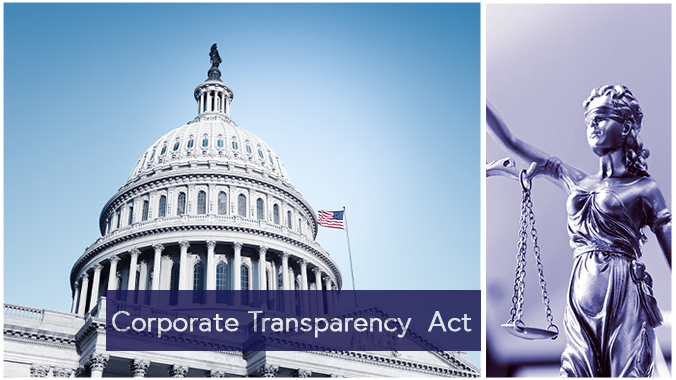The Corporate Transparency Act Reporting Obligations



$245.00 3 hour CLE
MCLE Credit Information:
Select Your State Below to View CLE Credit Information
Can't Decide Which CLE Program?
Access All
myLawCLE Programs
Only
$395yr
Annual Subscription includes access to:
- 500+ Live CLE Webinars
- National Hot Legal Topics
- New Laws and Regulations
- State Specific Programs
- All Formats: Live, Replay, & On-Demand
Training 5 or more people?
Sign-up for a law firm subscription plan and each attorney in the firm receives free access to all CLE Programs
Program Summary
Session I - The Corporate Transparency Act and Beyond – Jason Warner
This session provides a comprehensive overview of the Corporate Transparency Act (CTA) and related regulatory aspects, providing a structured breakdown into key sections. This program will serve as a valuable guide for navigating the complexities of the Corporate Transparency Act and related regulations.
Key Topics
- The Corporate Transparency Act and Beyond
- Background/Rationale
- Effective Date/Reporting Schedule/Deadlines
- Reporting Company
- Reporting Company Exemptions
- Beneficial Owner
- Applicant and Supervisor
- Penalties
- Impact on Law Firms
- Access and Security proposed regulations--reaction by banks, transparency advocates
- Closing Remarks
Session II - Here Comes the Sun: The corporate transparency act reporting obligations – Robert Dube
The Corporate Transparency Act imposes significant new reporting obligations on corporate entities based on a stated goal of cracking down on money laundering and drug cartels. This presentation will explain the reporting obligations, exceptions to the same, and the penalties for failure to comply. Further, there will be a short exploration of how this could affect litigation going forward.
Key Topics
- Specific details that have to be reported
- Elements that qualify or disqualify a business from having to report
- Penalties for failure to report
- How it could affect determinations of diversity jurisdiction in civil litigation going forward
Session III - Effect of the Corporate Transparency Act and Related AML Initiatives on the Real Estate Sector – Andrew Weiner
This session will delve into the intricate implications of the Corporate Transparency Act (CTA) on the real estate sector. This discussion will focus on the unique impact of the CTA and Anti-Money Laundering (AML) regulations on real estate entities. We will explore how these regulations affect large operating companies, holding companies, and Special Purpose Entities (SPEs), as well as their disclosure liabilities for lenders. Additionally, we will analyze the CTA within the broader AML context, considering its interface with existing AML disclosure regimes, such as Geographic Targeting Orders (GTOs), the Enablers Act, the Anti-Money Laundering Act of 2020 (AFIDA), and the Illicit Cash Act (IISA).
Furthermore, we will examine the recent FinCEN Real Estate Advanced Notice of Proposed Rulemaking (ANPRM) issued on December 21 and its implications. Our discussion will also encompass the evolving landscape of state and local laws, the impact of these regulations on real estate transactions, and the resultant changes in real estate documentation, due diligence processes, company structures, documents, and Directors & Officers (D&O) insurance. Lastly, we will explore the role and influence of legal practitioners in navigating these regulatory changes.
Key Topics
- Application of exemptions to SPE’s and other entities used for real estate investments, including trusts and pooled investment vehicles
- Whether lenders, advisors, board members and others will be “beneficial owners”
- How to apply the CTA rules to complex capital structures
- Other AML initiatives that impact or may impact real estate
- Due diligence and drafting responses in real estate transactions
Date / Time: April 30, 2024
- 1:00 pm – 4:20 pm Eastern
- 12:00 pm – 3:20 pm Central
- 11:00 am – 2:20 pm Mountain
- 11:00 am – 1:20 pm Pacific
![]() Closed-captioning available
Closed-captioning available
Speakers
 Jason Warner | Law Offices of Jonathan H. (Jason) Warner, P.A.
Jason Warner | Law Offices of Jonathan H. (Jason) Warner, P.A.
Jonathan H. (Jason) Warner concentrates his practice on international tax matters. He is a former chair of the Florida Bar Tax Section and was named the Section’s ‘Tax Attorney of the Year” in 2008. He was a principal participant in the Section’s FIRPTA withholding tax project that resulted in enactment of a new model federal tax withholding system. He is a past Chair of the Committee on International Tax of the ABA Section of International Law and Practice, and has authored several comments to Congress and the Treasury on pending federal legislation or regulations.
He has been a frequent speaker and writer on international and other tax topics. He received his J.D. degree in 1971 from Columbia University School of Law, where he was Managing Editor of the Columbia Journal of Transnational Law. Prior to opening his own practice in 1999, he was a partner in the law firms Greenberg, Traurig; Fowler, White (Miami); and Baker & McKenzie. An early adaptor to telecommuting, he now works primarily from the North Carolina mountains.
 Robert Dube | Eckland & Blando
Robert Dube | Eckland & Blando
Robert “Robby” Dube grew up working in his family’s small business and ranch, so he understands the needs of businesses and works tirelessly to advocate for them in a cost-effective manner. He is a zealous litigator, having briefed, argued, and won numerous motions before both state and federal courts across the country, including maritime and admiralty cases, and has engaged in every stage of the litigation process. Robby also has deep experience with the factoring industry, and in the customs industry, litigating for and advising clients across the country.
Robby is deeply familiar with pursuing claims against all levels of government, including bid protests, municipal litigation, challenging terminations for cause, drafting requests for equitable adjustments, and producing government contract compliance guides for businesses. He has engaged in significant Administrative Procedures Act challenges against the federal government’s regulations under the ESA and MMPA at the district and Circuit level, winning unanimous decisions.
Robby is passionate about fighting for civil rights and civil liberties and has zealously and effectively represented citizen groups across the country wherever their government has tried to take away their rights to referendum, free speech, free association, and more. Recently, Robby has been involved in the fight against foreign ownership of crucial infrastructure projects, fighting to protect national security and the environment.
Robby graduated magna cum laude from the University of Minnesota Law School, where he served as Law Council President and as Executive Editor of the Minnesota Journal of International Law. He also served as the Head Writer for the law school musical group T.O.R.T. (Theatre of the Relatively Talentless) and led the Orientation Program as a Program Director. After graduating, Robby clerked for Hawai’i Supreme Court Associate Justice Richard Pollack.
 Andrew Weiner | Pillsbury Winthrop Shaw Pittman
Andrew Weiner | Pillsbury Winthrop Shaw Pittman
Pillsbury Real Estate partner Andrew Weiner’s practice is global in scope, with a significant and sustained concentration on transactions in the New York metropolitan area.
Since 1976, Andrew has represented domestic and foreign clients in equity and debt transactions, the creation of real estate funds and joint ventures, and transactions involving distressed real estate.
Andrew’s practice has had a significant concentration in the hospitality and real estate investment trust (REIT)sectors, and in leasing. His clients have included funds, family offices, institutional lenders, universities, non-U.S. investors and New York City developers. Andrew Weiner is a prominent figure in real estate law, known for his work that includes:
Representing a Swedish public real estate company in joint ventures with a Manhattan-based developer to acquire and develop four sites in Manhattan as boutique office buildings, as well as an early-stage investment in a real estate company.
Representing a New York-based university/medical center in various real estate transactions over three decades, including the acquisition or master lease of nine dormitories and multiple administrative facilities, over 3 million square feet of leasing as landlord or tenant, P3 transactions, development of a biotechnology center, and reorganization of an academic medical center as a commercial condominium.
Representing Prima Mortgage Investment Trust LLC as a co-lender advancing more than $100 million of a $200 million acquisition loan used to finance the purchase of DreamWorks Animation’s headquarters and campus in Glendale, California.
Andrew Weiner’s education includes a J.D. from Harvard Law School, where he graduated cum laude in 1976, and a B.A. from Yale University, where he graduated magna cum laude in 1972.
Agenda
Session I – The Corporate Transparency Act and Beyond | 1:00pm – 2:40pm
- The Corporate Transparency Act and Beyond | 1:00pm – 1:05pm
- NDAA/AMLA
- Proposed and Final Regs
- Access and Security Proposed Regs
- Deferred rule: CDD Harmonization
- Pending real estate rules
- No Certificates in bearer form
- Technology
- Background/Rationale | 1:05pm – 1:10pm
- FATF report
- Prior legislative and regulatory initiatives
- ABA: Gatekeeper issue
- Old world of confidentiality in context
- U.S. tax initiatives/FATCA/CRS
- CRS; non-U.S. registries; public access
- FinCEN: Bank Secrecy Act mission expanded
- Cost and time estimate for reporting companies
- Dependent on cooperation by states to alert companies to filing requirement
- Effective Date/Reporting Schedule/Deadlines | 1:10pm – 1:20pm
- Existing Companies/New Companies
- Updates
- Corrective reports and safe harbor
- Reporting form –How to file; Who can file
- Reporting Company | 1:20pm – 1:30pm
- US corporations, LLCs
- LLPs/LLLPs, business trusts; similar entities
- Trusts/Partnerships excluded except in beneficial owner context
- Foreign entities
- Subsidiary of exempt company
- Exempt companies not required to report exemption; exceptions
- Loss of Exemption
- Reporting Company Exemptions | 1:30pm – 1:40pm
- Non-profits and homeowner associations
- Public accounting firms
- Money services business
- Charitable and Split-Interest Trusts
- Large operating company
- Inactive company
- Other
- Beneficial Owner | 1:40pm – 1:50pm
- Multiple beneficial owners increase compliance difficulty and risk of inadvertent error
- Tiered ownership
- Upper-tier trusts and partnerships
- Exceptions
- Substantial control issues
- Information to be provided on reporting form.
- FinCEN identifier
- Retention of beneficial ownership data by FinCEN
- Applicant and Supervisor | 1:50pm – 2:00pm
Break | 2:00pm – 2:10pm
- Penalties | 2:10pm – 2:20pm
- Aggregation of penalties
- No relief provision except safe harbor
- Reporting company
- Control person
- Indirect liability
- FinCEN penalty process
- Impact on Law Firms | 2:20pm – 2:30pm
- Reporting Company
- Applicant and Supervisor
- Ethics issues
- Law firms as gatekeepers
- Access and Security proposed regulations–reaction by banks, transparency advocates | 2:30pm – 2:35pm
- Consent required, but separate requests for each company
- Can’t search for other companies owned by beneficial owner
- Will banks receive updated or corrective filings?
- What to do if CDD information differs from CTA filing? No safe harbor for regulatory audits.
- Sharing restrictions re bank employees, foreign offices, independent auditors and third-party service providers
- Are banks required to access, or voluntary?
- Restrictions on domestic law enforcement
- Restrictions on foreign law enforcement
- Access by federal agencies
- No verification of information
- Security—prior FinCEN leak of SARS
- Susceptibility to scams
- Closing Remarks | 2:35pm – 2:40pm
- Compliance cost
- Verification or validation
- Will FinCEN be ready?
- What else is coming?
- Is CTA really necessary or useful?
Session II – Here Comes the Sun: The corporate transparency act reporting obligations | 2:40pm – 3:50pm
- Specific details that have to be reported | 2:40pm – 2:55pm
- Elements that qualify or disqualify a business from having to report | 2:55pm – 3:10pm
Break | 3:10pm – 3:20pm
- Penalties for failure to report | 3:20pm – 3:35pm
- How it could affect determinations of diversity jurisdiction in civil litigation going forward | 3:35pm – 3:50pm
Session III – Effect of the Corporate Transparency Act and Related AML Initiatives on the Real Estate Sector | 3:50pm – 4:20pm
- Application of exemptions to SPE’s and other entities used for real estate investments, including trusts and pooled investment vehicles | 3:50pm – 3:55pm
- Whether lenders, advisors, board members and others will be “beneficial owners” | 3:55pm – 4:00pm
- How to apply the CTA rules to complex capital structures | 4:00pm – 4:05pm
- Other AML initiatives that impact or may impact real estate | 4:05pm – 4:10pm
- Due diligence and drafting responses in real estate transactions | 4:10pm – 4:20pm







